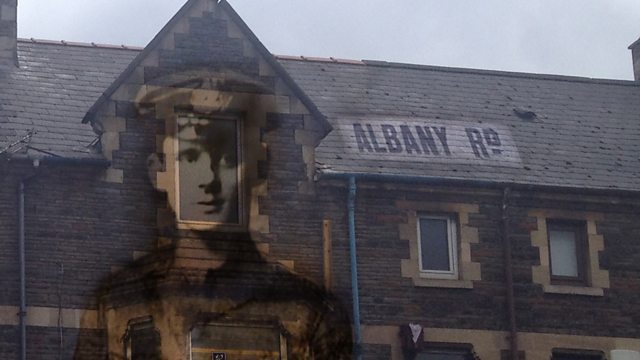Albany Road, Cardiff: Executed for Desertion
Edwin Dyett Executed for Desertion
Most of the fighting during World War One was carried out by land armies in Europe. Due to extremely heavy casualties, the Naval Division was called upon to help in The Somme.
Edwin Dyett was a young and somewhat ineffective junior officer in the Nelson Battalion of the 63rd (Royal Naval) Division. In October 1916 Dyett found himself along with the rest of the Division on the Somme and about to take part in the battle of Beaucourt in the Ancre Valley.
By this time he had already made application to transfer away from the front as he didn’t believe that he was suitable – an impression shared by his Company Commander. Not considered to be quality material, he was left as a reserve officer and it was only in the course of the battle with confusion all around, that he was sent forward with reserves.
Not being able to find anyone from his unit, Dyett and another officer decided to return to Brigade Headquarters for more information. At Beaucourt Station they met up with a junior officer on staff duties who had a number of men with him who needed taking back to the front.
Whilst his companion accompanied the men back to the front and went on to take part in the latter stages of the battle, Dyett took offence at being ordered by a junior officer and continued on his way towards the rear. He met up with a number of soldiers who were also lost, but in the dark none of them could find Brigade HG and they spent the night in a shell hole.
The junior officer put in a report to HQ explaining Dyett’s refusal to go forward. The following day Dyett was found at Englebelmer quite a few kilometers behind the front line. He was placed under arrest and later charged with desertion.
The trial was held at la Ferme du Champ Neuf near St Firmin near Le Crotov. Dyett did not give evidence and the officer acting in his defence did a very poor job. Edwin was sentenced to death, with a plea for mercy by Major-General Shute of the 63rd Division on account of his age and lack of experience.
Around this time there was disquiet among soldiers that executions for cowardice and desertion were confined to the ranks. Field Marshal Douglas Haig had ordered that anyone convicted of desertion or cowardice be shot as an example.
Even though the Court recommended mercy due to his age, Welsh officer Lt. Edwin Dyett of 66 Albany Road, Cardiff was shot at dawn on the 5 January 1917, without any chance of an appeal.
Location: Albany Road, Roath, Cardiff, CF24 3RR
Duration:
Credits
| Role | Contributor |
|---|---|
| Presenter | Historian, Dr Gerard Oram |
| Presenter | Historian Dr Julian Putkowski |
| Producer | Melanie Lindsell |
This clip is from
Featured in...
![]()
����ý Radio Wales—World War One At Home
Places in Wales that tell a story of World War One
![]()
Memory—World War One At Home
Memorials and the commemoration of wartime lives
More clips from World War One At Home
-
![]()
The loss of HMY Iolaire
Duration: 18:52
-
![]()
Scotland, Slamannan and the Argylls
Duration: 07:55
-
![]()
Scotland Museum of Edinburgh mourning dress
Duration: 06:17
-
![]()
Scotland Montrose 'GI Brides'
Duration: 06:41







